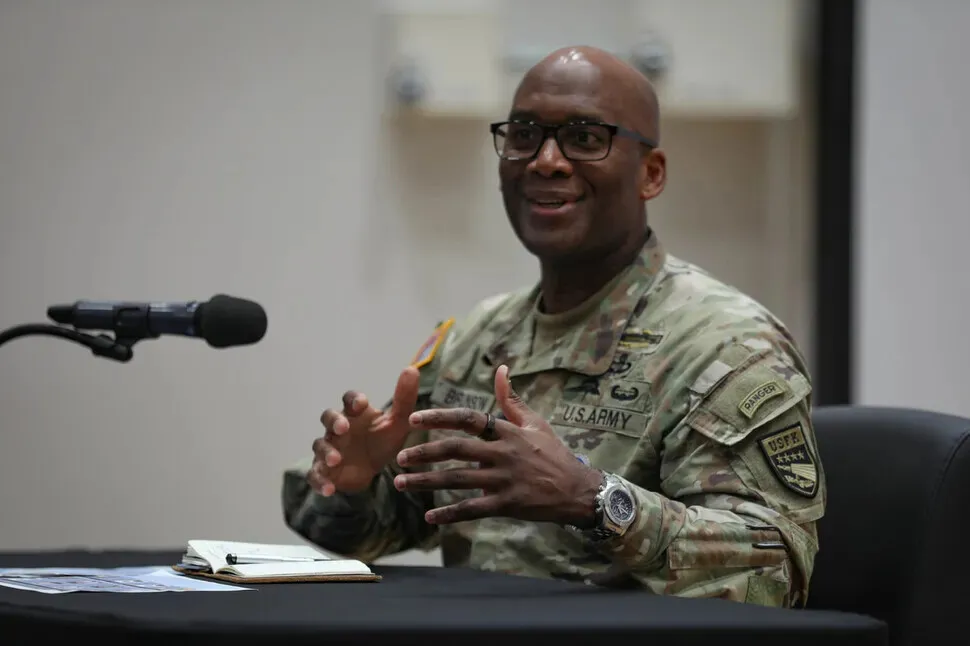hankyoreh
Links to other country sites 다른 나라 사이트 링크
[Editorial] Korea must prioritize national interest in response to talk of USFK reductions

The commander of US Forces Korea expressed openness to the possibility of a drawdown of US troops in Korea in a recent press briefing, emphasizing that “capabilities” were more important than “numbers” in terms of modernizing the alliance between South Korea and the US. His comments were soon followed by a report by a major US news outlet that Washington attempted to elicit support for the “strategic flexibility” of US troops in Korea during recent tariff negotiations.
As the first summit between President Lee Jae-myung and US President Donald Trump will take place later this month, a discussion that will fundamentally change the Korea-US alliance is soon to begin. We must partake in these negotiations in earnest, but firmly draw a line at excessive demands that may pose serious threats to our national interest.
At the press briefing on Friday, Gen. Xavier Brunson, commander of USFK, stated that “alliance modernization” is an effort to account for the changes undergone by the US and Korea over the past 75 years, as well as a reflection of the “recognition that the world’s changed around us.”
He emphasized that the discussions on how to reflect such changes in the USFK should focus on “capabilities” rather than “numbers.” Strongly insinuated here is the downsizing of US troops in Korea, which currently number at 28,500.
Defining “strategic flexibility” as the ability to be able to relocate US forces depending on the US’ military needs, Brunson was adamant that this capacity is “what we seek to always be able to do,” stressing in context of the Taiwan-China conflict that if “something happens” in the Seoul-Tokyo-Manila corridor spanning both the East and South China Seas, there would be a “call for nations to react accordingly.”
Despite noting that it was not a “foregone conclusion” that Korea must accompany the US in its military actions, Brunson did remark that Seoul was being asked to “be stronger against [the] DPRK” — that is, North Korea — “[so] that we might have the flexibility as we modernize our alliance so that we could go do other things.”
On Saturday, The Washington Post reported that the US “also wanted Seoul to boost defense spending to 3.8 percent of GDP, up from 2.6 percent last year” and aimed to obtain a political statement supporting flexibility for USFK force posture.
In order to protect our national interest amidst such complexities, we must respond firmly to the prospect of a drawdown of US troops in Korea as was implied by Brunson. The moment we panic at the change in numbers, we will have to accept several other unreasonable demands from the US.
Furthermore, we must consider adopting a safety measure so that we are not automatically implicated in conflicts within the Indo-Pacific region. For example, we might make prior consultation a mandatory step before involvement so that Korea does not become a launch base for suppressing or attacking China, and confirm that cooperation regarding a Taiwan conflict is not a requirement based on the mutual defense pact adopted by the US and Korea in 1953.
Please direct questions or comments to [english@hani.co.kr]

Editorial・opinion
![[Editorial] Korea must prioritize national interest in response to talk of USFK reductions [Editorial] Korea must prioritize national interest in response to talk of USFK reductions](https://flexible.img.hani.co.kr/flexible/normal/500/300/imgdb/original/2025/0811/7417549025880585.jpg) [Editorial] Korea must prioritize national interest in response to talk of USFK reductions
[Editorial] Korea must prioritize national interest in response to talk of USFK reductions![[Editorial] Presidential office administrator called on far right to shield Yoon from arrest [Editorial] Presidential office administrator called on far right to shield Yoon from arrest](https://flexible.img.hani.co.kr/flexible/normal/500/300/imgdb/original/2025/0811/8817549005592931.jpg) [Editorial] Presidential office administrator called on far right to shield Yoon from arrest
[Editorial] Presidential office administrator called on far right to shield Yoon from arrest- [Editorial] The ex-first lady and president doth protest too much
- [Correspondent’s column] Gerrymandering and the state of America to come
- [Editorial] Bolder measures needed to bring Pyongyang to dialogue table
- [Editorial] Anti-corruption official’s death must not be in vain
- [Editorial] The end of Kim Keon-hee’s untouchability
- [Editorial] Essential preparation for new chapter of ROK-US alliance
- [Column] After tariff typhoon, is a security storm in store for Korea next?
- [Editorial] We’ve seen enough of Yoon’s shameless behavior
Most viewed articles
- 1[Editorial] Korea must prioritize national interest in response to talk of USFK reductions
- 2Yoon and Kim could make history as first ex-presidential couple both behind bars
- 3[Editorial] Presidential office administrator called on far right to shield Yoon from arrest
- 4USFK commander stresses changing geopolitical environment in pitch to ‘modernize’ alliance
- 5Official from Yoon’s office instructed supporters to be ready to stop president’s arrest
- 6USFK commander hints at changes to US troop presence in Korea
- 7US pumps breaks on talk of OPCON transfer
- 8Kim Keon-hee in hot water over additional off-color comments
- 9Diary entry reveals Japanese cover-up of massacre
- 10Korean president’s actions amounted to criminal insurrection, many legal experts say